Blog
August 11th, 2010
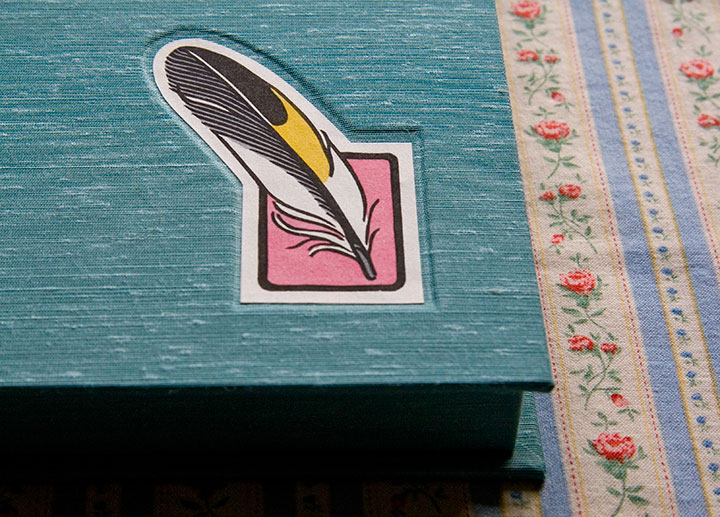
I’ve been sitting on this post for months now—it’s just that after spending so much time hunched over this project, I needed some time off from even thinking about it. But now I’m ready to talk birds again.

From left: Cedar Waxwing; Steller’s Jay; American Avocet; Purple Martin; Tufted Puffin
Eighteen months, twenty-five birds, six hundred twenty-five individual prints and ten box sets later, my little Flock is finished.

Mountain Quail; American Bittern; Long-billed Curlew; Hooded Merganser; Laysan Albatross

Barn Owl; American Kestrel; Eurasian Coot; Anna’s Hummingbird; Herring Gull
It’s a little crazy to see these all together, like, well, birds on a wire. Each one has been broken down into its own little assembly line for so long that I forget sometimes to see them as a set.

Western Tanager; Lazuli Bunting; Northern Flicker; Bullock’s Oriole; Belted Kingfisher

Common Loon; Marbled Murrelet; Northern Shoveler; Harlequin Duck; Brown Pelican
As you can see, what’s represented here is a pretty broad cross-section of Washington birds. There are so many bird species ’round these parts, in fact, that I almost didn’t know where to start—and narrowing the choices down to twenty-five was by far the most difficult task.
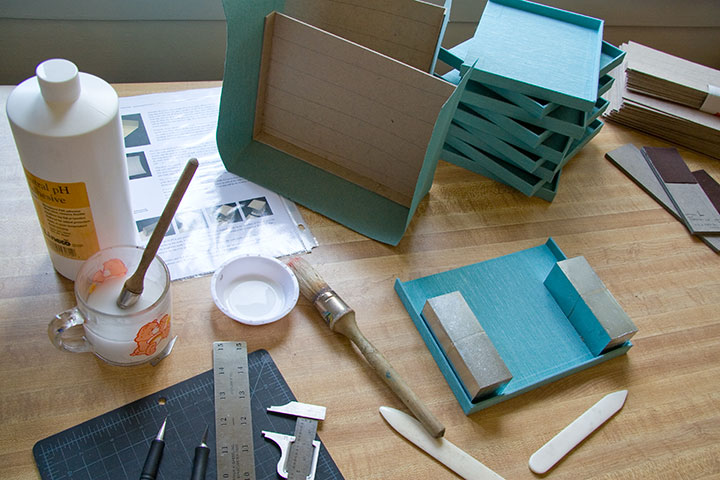
Wait. I take that back. The hardest part was keeping the glue off of the pricey imported Japanese book cloth (glue plus cloth equals death—or at least wailing, gnashing of teeth, and starting all over from the beginning).
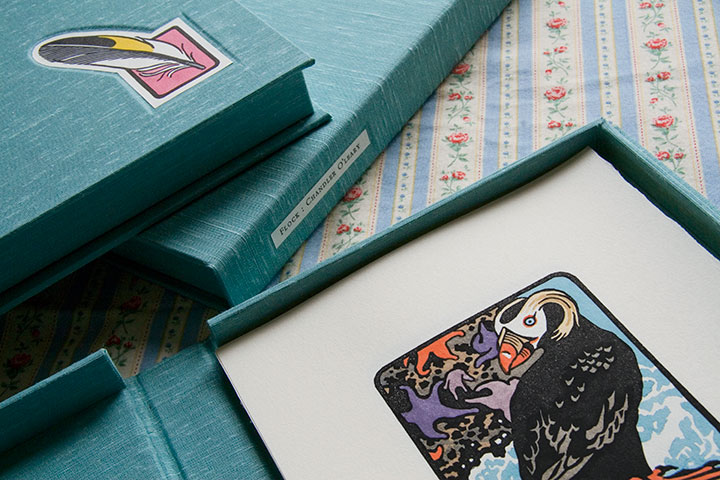
You see, it seemed silly to have a set of prints with nothing to house it. My inner book artist took over (thanks to Jessica’s tricksy enabling), and insisted on encasing the first ten sets of the edition in handmade clamshell boxes.
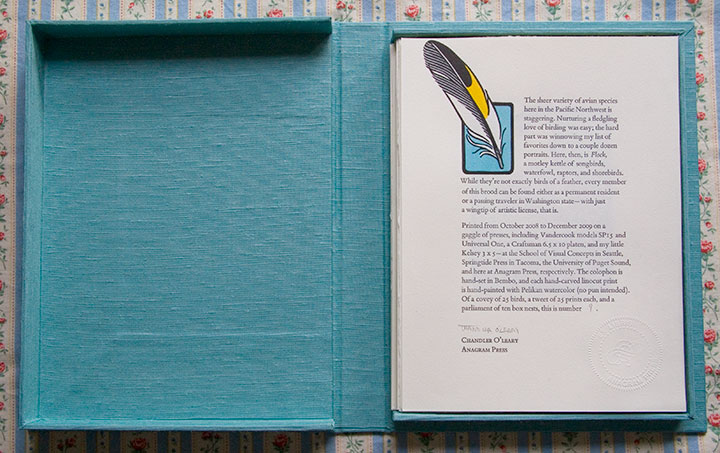
Even though the results are always worth it, I don’t have much love for making boxes—what I do love is printing the colophon. A colophon (or in today’s hardbound novels, the “note on the text”) is an essential element in any artist’s book; this is where the artist steps outside the book’s content and talks about the making of the book itself. For this I decided to go back to my letterpress roots, and hand-set the text in metal type.
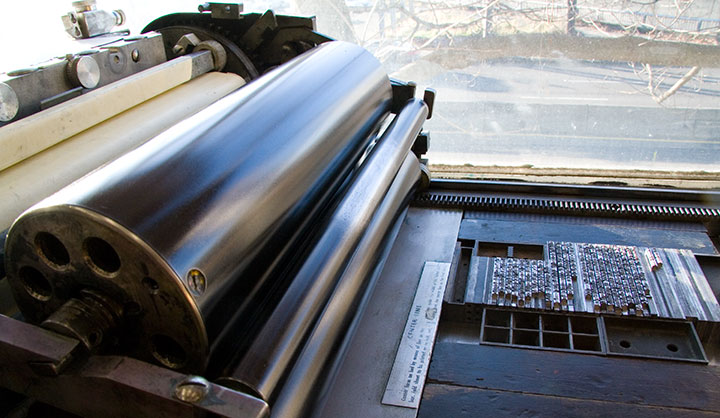
While I’m rarely able to fit hand-setting into my projects these days (a drawback to all the lettering I’ve been doing), it’s still my favorite method of getting a block of text onto a page. And this beloved Bembo, cast locally at Stern & Faye, is so beautifully spaced and balanced that it’s a dream to set and a pleasure to read.
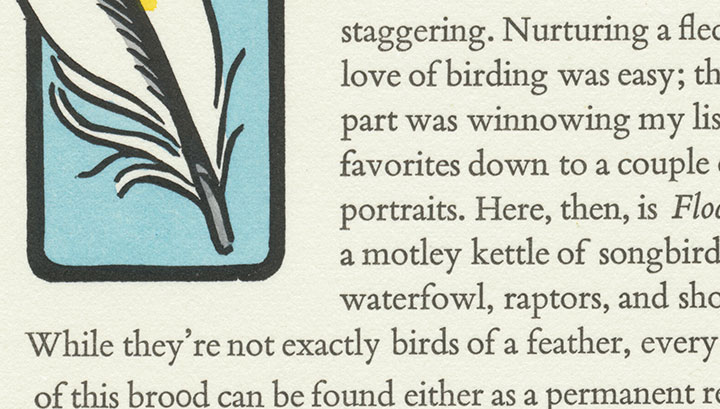

Here’s what it says:
The sheer variety of avian species here in the Pacific Northwest is staggering. Nurturing a fledgling love of birding was easy; the hard part was winnowing my list of favorites down to a couple dozen portraits. Here, then, is Flock, a motley kettle of songbirds, waterfowl, raptors, and shorebirds. While they’re not exactly birds of a feather, every member of this brood can be found either as a permanent resident or a passing traveler in Washington state—with just a wingtip of artistic license, that is.
Printed from October 2008 to December 2009 on a gaggle of presses, including Vandercook models SP15 and Universal One, a Craftsman 6.5 x 10 platen, and my little Kelsey 3 x 5—at the School of Visual Concepts in Seattle, Springtide Press in Tacoma, the University of Puget Sound, and here at Anagram Press, respectively. The colophon is hand-set in Bembo, and each hand-carved linocut print is hand-painted with Pelikan watercolor (no pun intended). Of a covey of 25 birds, a tweet of 25 prints each, and a parliament of ten box nests, this is number [2].
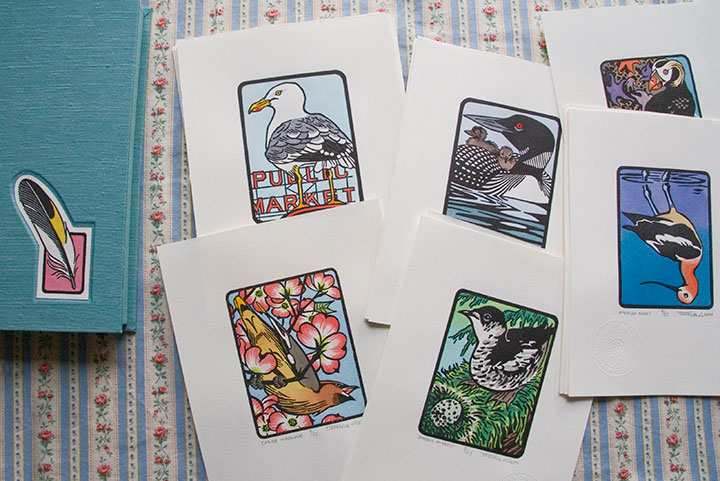
Okay, so maybe I went a bit overboard on the avian puns. It’s just that the thought of getting my hands dirty on type drawers again had me all twitterpated.
And I have a fluttering feeling that there might be even more birds in my future—one of these days, anyway.
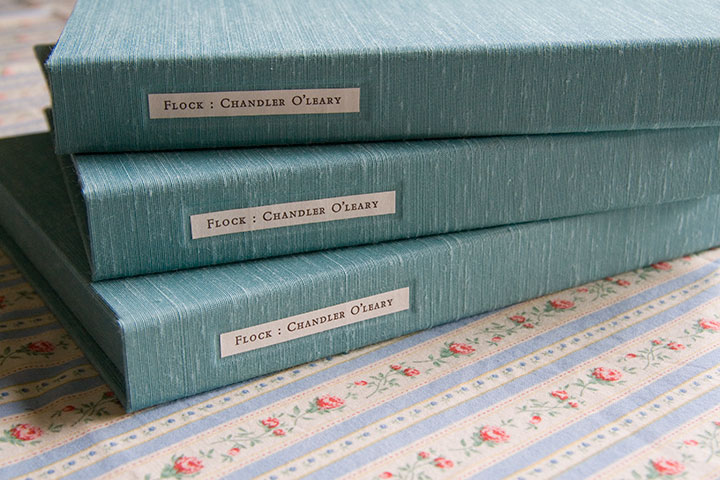
April 28th, 2010
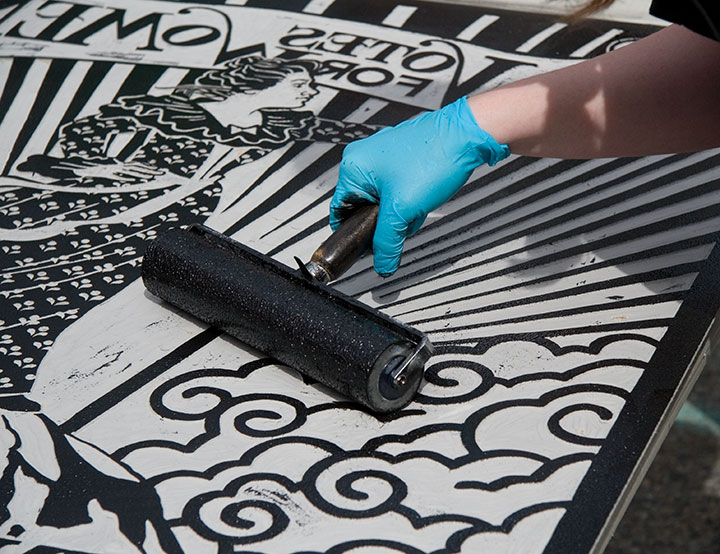
Inked up,
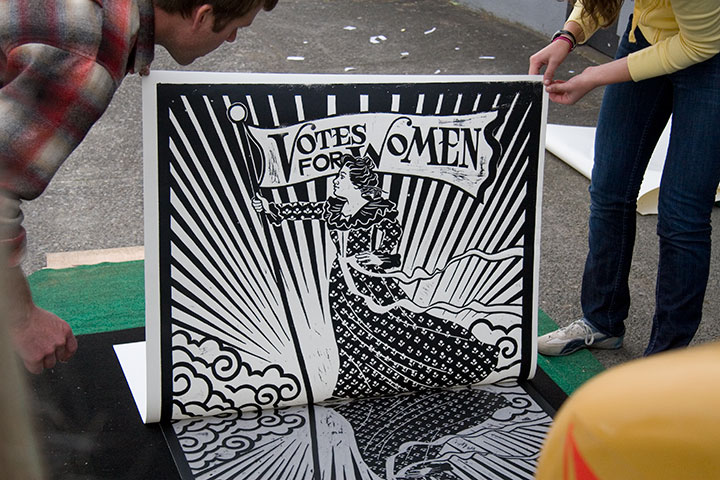
hand-pulled,
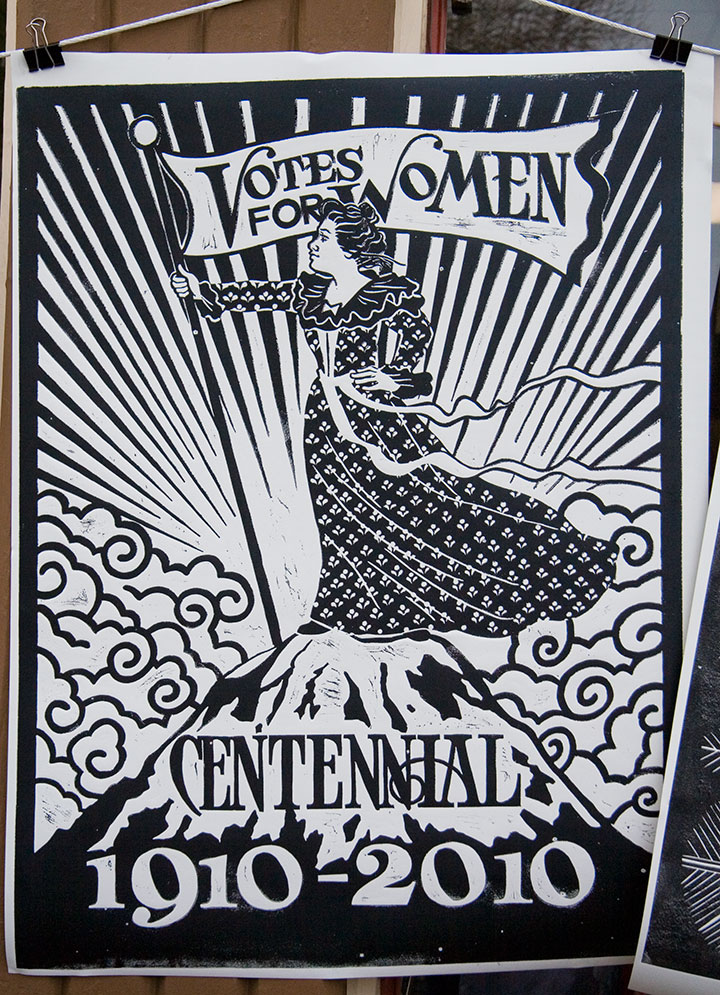
and voilà! Our second collaborative steamroller print, an unofficial Dead Feminist, inspired by Cora Smith Eaton King, who in 1909 climbed Mt. Rainier with a party of Seattle Mountaineers and placed a “Votes for Women” banner at the summit.
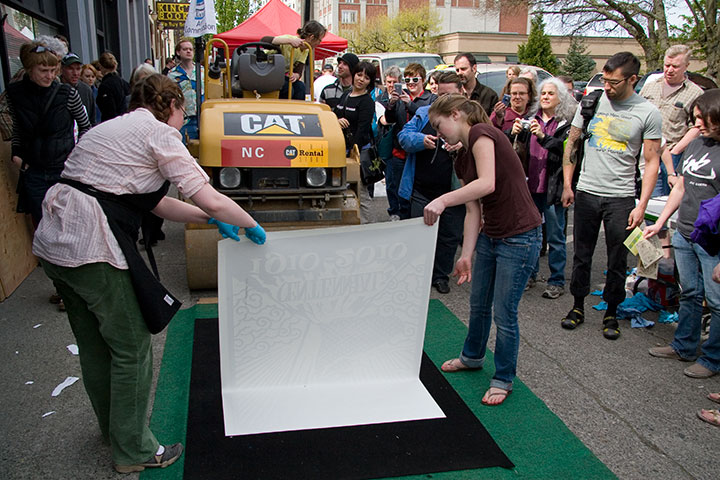
This year’s Wayzgoose was the biggest bash yet! We had all the regulars—
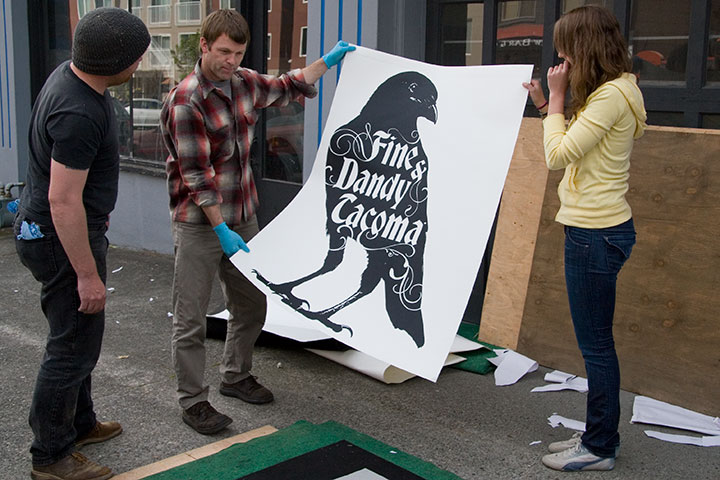
who churned out perfection under pressure (no pun intended)—
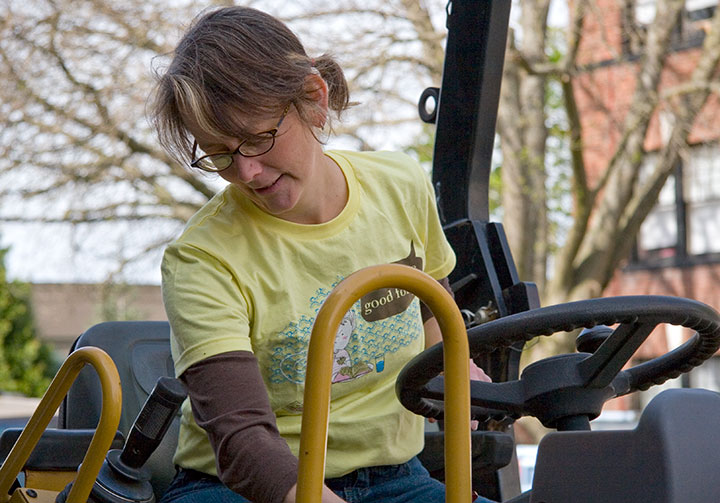
our beloved ringleader,
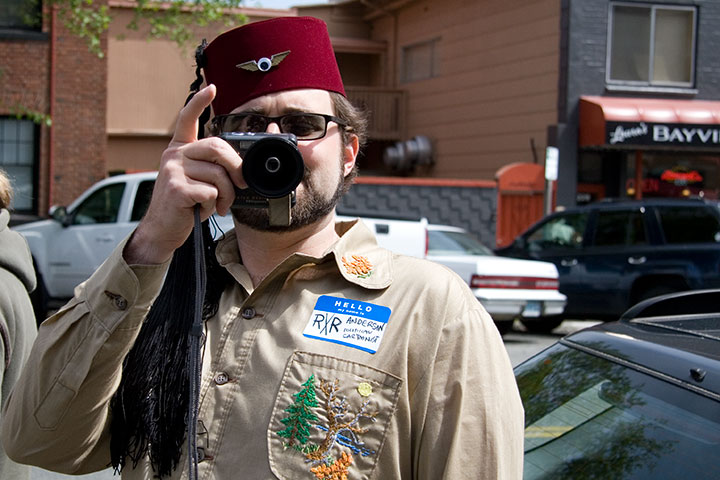
a certain befezzed flavor,
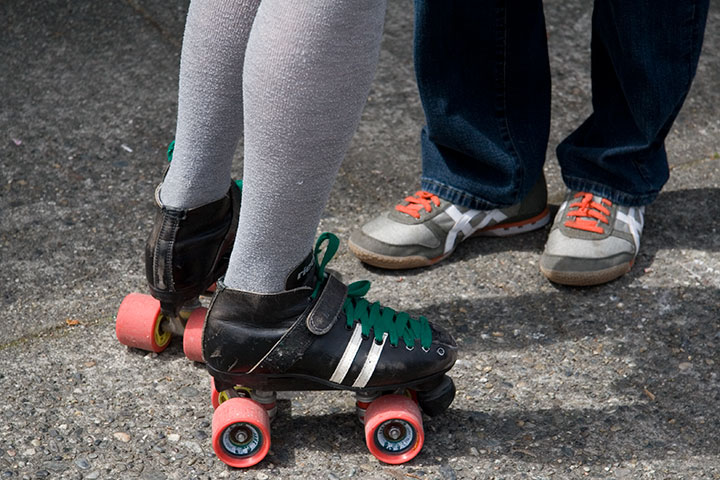
and a whole host of newcomers to round out the experience.
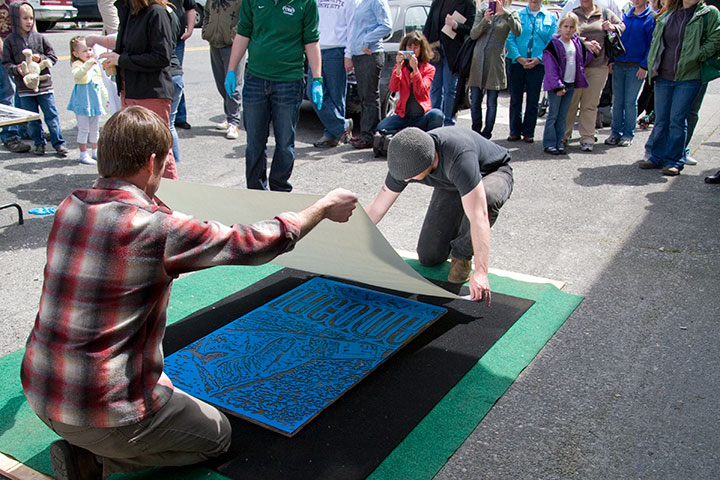
We had an enormous crowd (thank goodness for the good weather!),
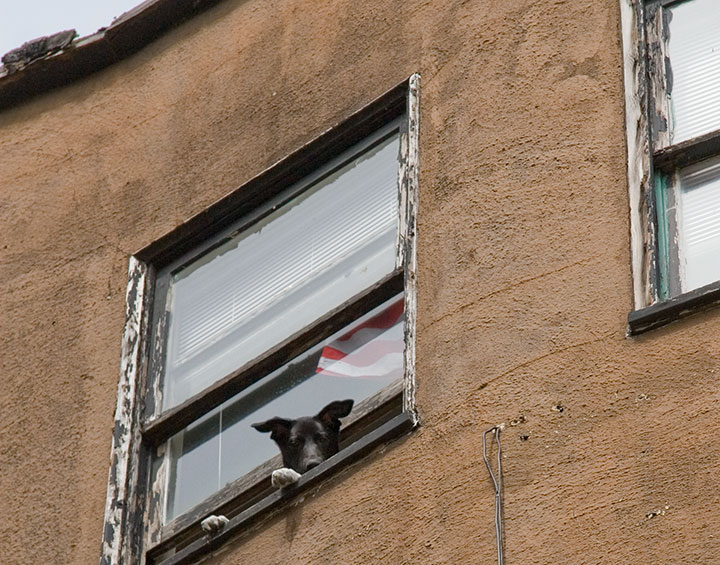
and even a few unexpected audience members.
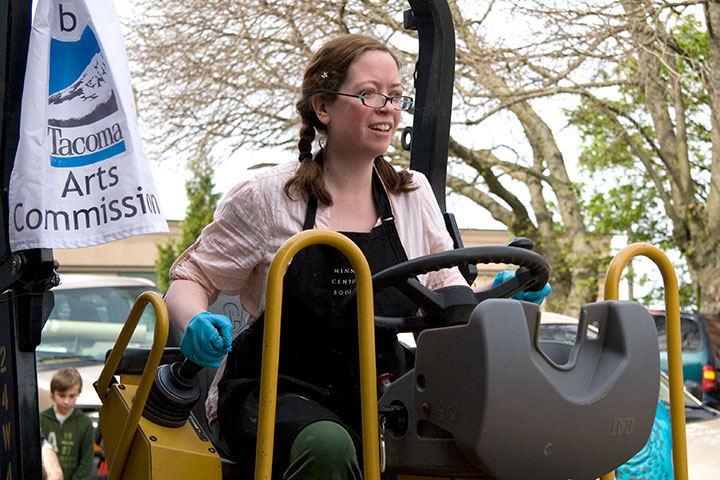
This year I got to try my hand at driving the steamroller,
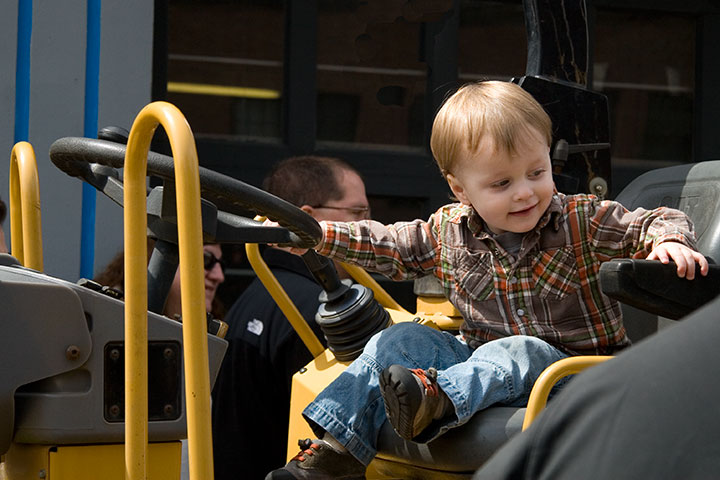
but I think pretending was plenty enough for this little guy.
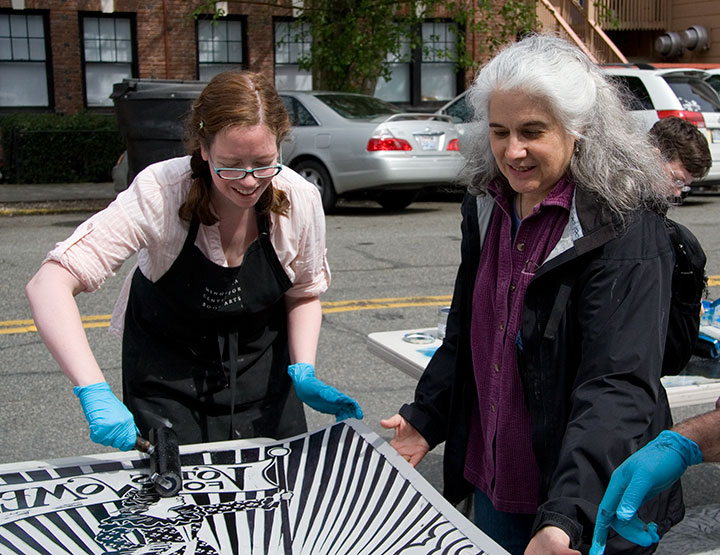
Thanks to everybody who stopped by to say hello, or stuck around to lend a helping hand.
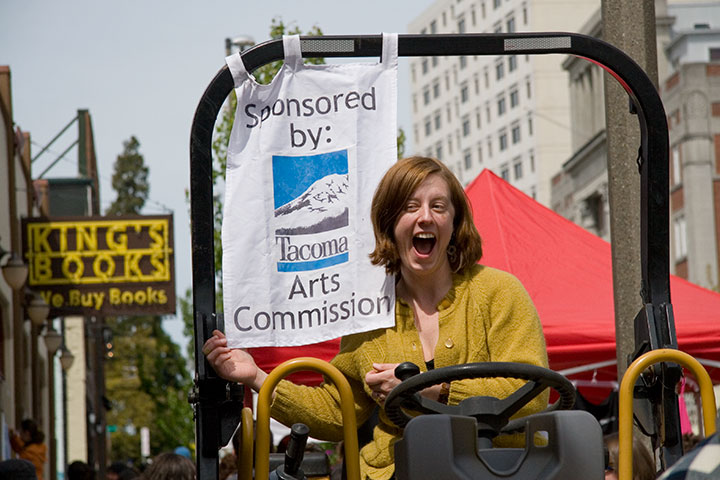
And of course, a huge bucket of gratitude to the Tacoma Arts Commission for making it all happen!
One more acknowledgement: photography by Michael O’Leary. Thanks, Dad!
November 20th, 2009
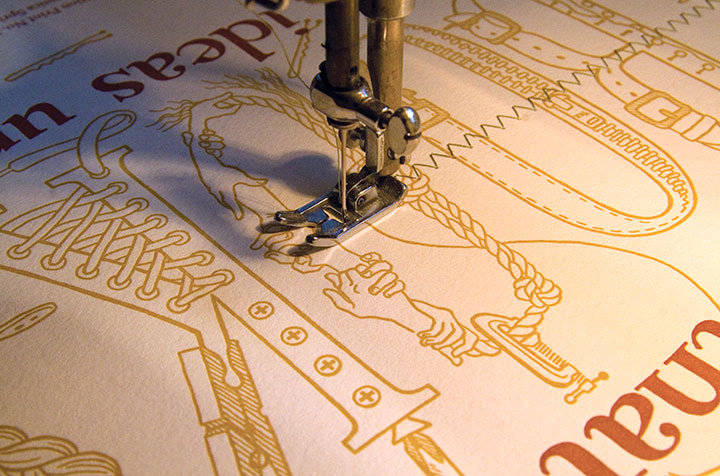
People who stop by the house for the first time must really think I’m strange. Never mind our own personal farmers market residing in the attic and root cellar—these days the place looks like the the visual-art equivalent of Willy Wonka’s Chocolate Factory, with snips of paper, rows of identical bird portraits, bright watercolor cakes, brushes and pencils, boxes of envelopes, shipments waiting to go out, and stacks of prints covering every horizontal surface. It certainly gives new meaning to the term “cottage industry.” I guess that’s what happens when you decide to double your inventory right before the holidays.
This week, though, there was a new element to the chaos: the drone of the sewing machine. And now that all the threads are tied off, Jessica and I are finally ready to unveil a little secret we’ve been sitting on for a few months. Seattle Center for Book Arts (SCBA) asked us to create their second-annual Special Edition Print, and I’m happy to report that they’re now available for sale.
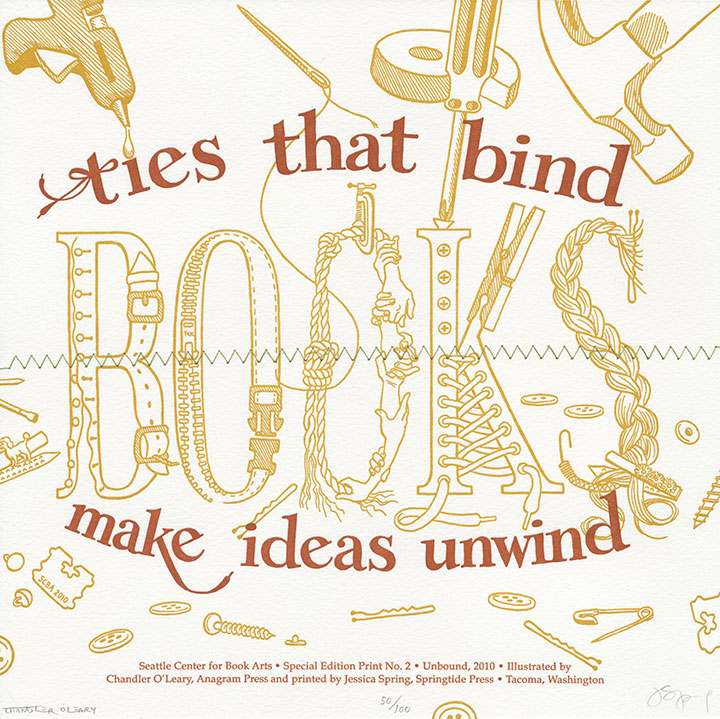
Each year the Special Edition Print has the theme of “Unbound,” and the folks at SCBA challenged us to interpret it how we liked. So instead of our customary work with famous quotes, Jessica whipped up a little gem of her own. We started thinking about all the ways something (not just a book!) might be bound or unbound, which led us to visions of lacing, pinching, tying, zipping, braiding, taping, clamping, buttoning, stitching, buckling, hammering, gluing, clipping, lashing and pinning. Which then, of course, gave me free reign to make an absolute, giddy mess of things, and scatter fasteners and notions all over the page. My favorite additions to the drawing, though, are the bread tags. My grandmother had a whole drawer full of them in her kitchen (did she ever use them, or did I just discover the source of my pack-rat tendencies?), and I loved the way they rattled around in there. So Nana, this one is for you.
Everything is hand-drawn and lettered (as per usual), then letterpress printed in copper ink and an ochre color that is precisely the shade of those little Bit o’Honey candies (remember those?). This time, though, we’ve added a little extra goodie: a line of zig-zag stitching in cotton thread, in exactly the green of copper patina. SCBA is the only place to get these prints, so if you’d like to play a little game of Button, Button, Who’s Got the Button, you can get your copy here.
September 22nd, 2009
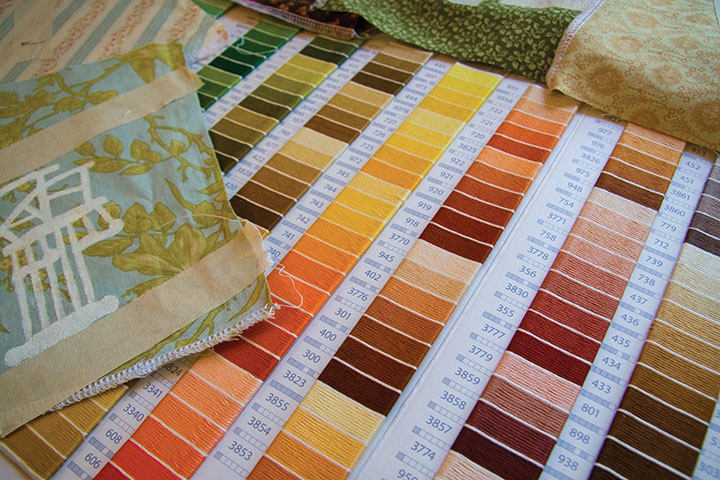
Swatch books are very near the top of my list of Favorite Things Ever. There is something so satisfying about having every color, pattern, texture, or finish right at your fingertips. I love sitting at my table, with a cup of tea in hand and six hundred sample chips spread out before me, ready for some serious color theory. (In case you’re wondering, this is the amaze-a-crazy DMC embroidery floss über color card. Well-made swatch books like this tend to be expensive to produce, and impossible to find once they go out of print. So if you’re into this sort of thing, I’d suggest snagging your copy before they decide to quit selling them.)
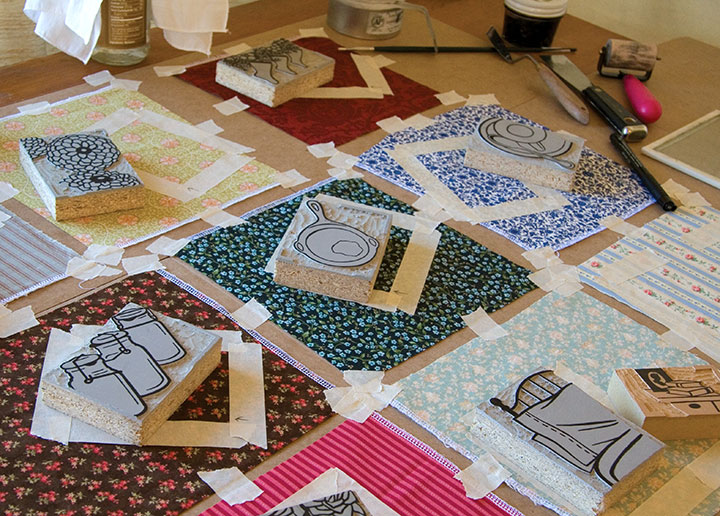
These days the studio has been an explosion of choices. Snippets of fabric and open dictionaries have taken over my life as I get ready for a new solo show, which opens October 14 at the Pacific Lutheran University Gallery. Stay tuned for more details in the next few weeks.
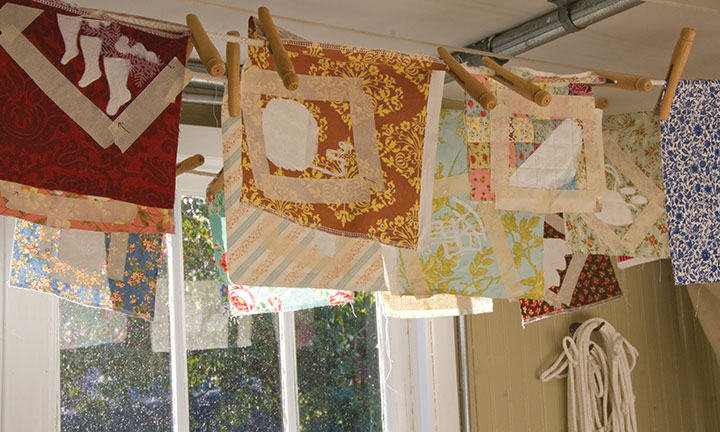
I wish I had something more concrete to show you, but this is one of those projects where everything comes together at once, right at the end (which can be as nerve-wracking as it is rewarding). I’ve got to say, though, that calico—finished or not—sure makes for pretty pictures.

![Chandler O'Leary [logo]](https://chandleroleary.com/wp-content/themes/chandleroleary/images/logo.png)































